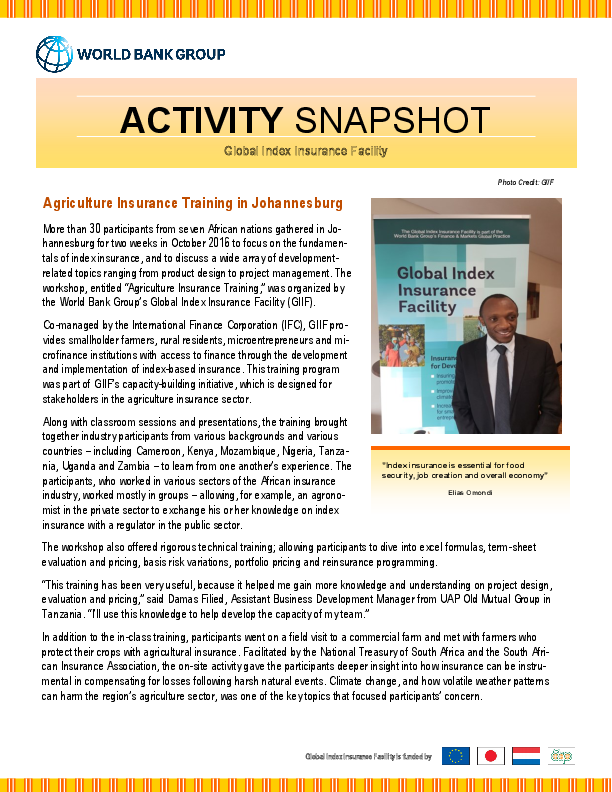Agriculture Insurance Training in Johannesburg

The workshop also offered rigorous technical training; allowing participants to dive into excel formulas, term-sheet evaluation and pricing, basis risk variations, portfolio pricing and reinsurance programming.
“This training has been very useful, because it helped me gain more knowledge and understanding on project design, evaluation and pricing,” said Damas Filied, Assistant Business Development Manager from UAP Old Mutual Group in Tanzania. “I’ll use this knowledge to help develop the capacity of my team.”
In addition to the in-class training, participants went on a field visit to a commercial farm and met with farmers who protect their crops with agricultural insurance. Facilitated by the National Treasury of South Africa and the South African Insurance Association, the on-site activity gave the participants deeper insight into how insurance can be instrumental in compensating for losses following harsh natural events. Climate change, and how volatile weather patterns can harm the region’s agriculture sector, was one of the key topics that focused participants’ concern.
“Climate change can adversely affect agricultural productivity, can increase the incidence of diseases, and can lead to water and food insecurity as well as to general economic instability,” said Julie Dana, Lead Financial Specialist, in her opening address to the workshop. “This problem is so complex and at such a large scale that no single individual actor can provide a solution. Therefore, it is important that, at events like this, all stakeholders — including governments, the private sector and the World Bank and other development agencies — join together to address the potentially adverse impacts of climate change, particularly in the agriculture sector.”
A sense of urgency about combating climate disruptions was shared among many participants. "Index insurance is essential for food security, job creation and the overall economy because it is meant to protect the farmers against adverse climatic events,” said Elias Omondi, an Actuarial Officer from Kenya’s Insurance Regulatory Authority. “Technical capacity should be focused on ensuring that partners across the entire value chain understand the important role of index insurance.”
As part of its primary strategies, GIIF will continue to provide a platform upon which stakeholders can learn from one other and ultimately collaborate on building sustainable solutions for the development of index insurance. GIIF will also continue to promote innovative approaches, such as index insurance, to help vulnerable populations build their resilience amid the threat of climate disruptions.
